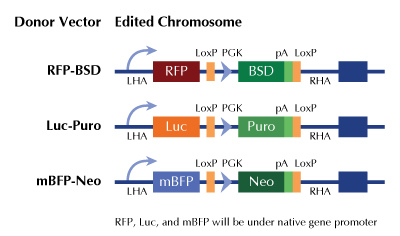Trp53 Mouse Gene Knockout Kit (CRISPR)
CAT#: KN318278RB
Trp53 - mouse gene knockout kit via CRISPR, HDR mediated
Functional Cassette: GFP-puro Luciferase-Puro mBFP-Neo
HDR-mediated knockout kit validation
USD 1,657.00
4 Weeks*
Specifications
| Product Data | |
| Format | 2 gRNA vectors, 1 RFP-BSD donor, 1 scramble control |
| Donor DNA | RFP-BSD |
| Symbol | Trp53 |
| Locus ID | 22059 |
| Components |
KN318278G1, Trp53 gRNA vector 1 in pCas-Guide CRISPR vector KN318278G2, Trp53 gRNA vector 2 in pCas-Guide CRISPR vector KN318278RBD, donor DNA containing left and right homologous arms and RFP-BSD functional cassette. GE100003, scramble sequence in pCas-Guide vector |
| Disclaimer | These products are manufactured and supplied by OriGene under license from ERS. The kit is designed based on the best knowledge of CRISPR technology. The system has been functionally validated for knocking-in the cassette downstream the native promoter. The efficiency of the knock-out varies due to the nature of the biology and the complexity of the experimental process. |
| Reference Data | |
| RefSeq | NM_001127233, NM_011640 |
| UniProt ID | P02340 |
| Synonyms | bbl; bfy; bhy; p44; p53; Tp53 |
| Summary | This gene encodes tumor protein p53, which responds to diverse cellular stresses to regulate target genes that induce cell cycle arrest, apoptosis, senescence, DNA repair, or changes in metabolism. p53 protein is expressed at low level in normal cells and at a high level in a variety of transformed cell lines, where it's believed to contribute to transformation and malignancy. p53 is a DNA-binding protein containing transcription activation, DNA-binding, and oligomerization domains. It is postulated to bind to a p53-binding site and activate expression of downstream genes that inhibit growth and/or invasion, and thus function as a tumor suppressor. Mice deficient for this gene are developmentally normal but are susceptible to spontaneous tumors. Evidence to date shows that this gene contains one promoter, in contrast to alternative promoters of the human gene, and transcribes a few of splice variants which encode different isoforms, although the biological validity or the full-length nature of some variants has not been determined. [provided by RefSeq, Jul 2008] |
Documents
| Product Manuals |
| FAQs |
| SDS |
Resources
Other Versions
| SKU | Description | Size | Price |
|---|---|---|---|
| KN318278 | Trp53 - mouse gene knockout kit via CRISPR, HDR mediated |
USD 1,657.00 |
|
| KN318278BN | Trp53 - mouse gene knockout kit via CRISPR, HDR mediated |
USD 1,657.00 |
|
| KN318278LP | Trp53 - mouse gene knockout kit via CRISPR, HDR mediated |
USD 1,657.00 |
|
| KN518278 | Trp53 - KN2.0, Mouse gene knockout kit via CRISPR, non-homology mediated. |
USD 1,657.00 |
|
| GA204449 | Trp53 CRISPRa kit - CRISPR gene activation of mouse transformation related protein 53 |
USD 1,657.00 |
{0} Product Review(s)
Be the first one to submit a review






























































































































































































































































 Germany
Germany
 Japan
Japan
 United Kingdom
United Kingdom
 China
China
